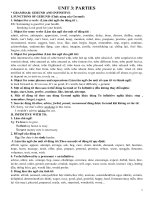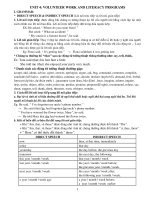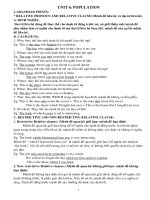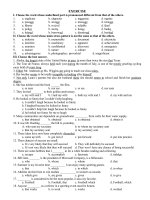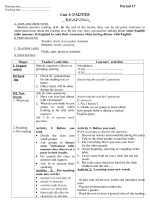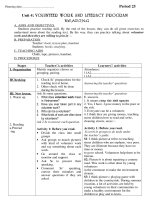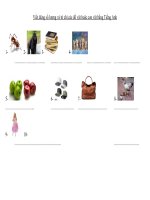bài tập TA 11 NC - unit 3
Bạn đang xem bản rút gọn của tài liệu. Xem và tải ngay bản đầy đủ của tài liệu tại đây (67.04 KB, 9 trang )
UNIT 3: PARTIES
* GRAMMAR: GERUND AND INFINITIVE
I. FUNCTIONS OF GERUND (Chức năng của Gerund):
1. Subject for a verb : (Làm chủ ngữ cho động từ ) .
EX: Swimming is good for your health.
Smoking is not good for your health.
2. Object for some verbs (Làm tân ngữ cho một số động từ) :
admit, advise, anticipate, appreciate, avoid, complete, consider, delay, deny, discuss, dislike, enjoy, finish,
can’t help, can’t bear, can’t stand, keep, mention, mind, miss, postpone, practice, quit, recall, recommend,
resent, suggest, hate, love, like, start, begin, forget, remember, stop, regret, continue, acknowledge,
endure(chòu đựng, cam chòu), imagine, justify, resist(kháng cự, chống lại), feel like, forgive, risk, tolerate.
3. Object for preposition (Làm tân ngữ cho giới từ):
tobe interested in, tobe fond of, tobe bored with, tobe fed up with, tobe afraid of, tobe surprised at, tobe
worried about, tobe amused at, tobe amazed at, tobe famous for, tobe different from, tobe good/ bad at,
tobe excited at/ about, tobe frightened of, tobe keen on, tobe pleased with, tobe relaxed with, tobe
exhausted at, tobe free from, tobe busy with, tobe absent from, tobe present at, tobe tired of, tobe terrified
of, tobe nervous of, tobe successful in, to be used to, to get used to, to think of/ about, to give up, to depend
on, to insit on, to rely on, ...
4. Object for some phrases and expressions (Làm tân ngữ cho một số cụm từ và thành ngữ):
to look forward to, It’s no use, It’s no good, It’s worth, have difficulty + gerund.
5. Một số động từ theo sau có thể dùng Gerund or To Infinitive đều không thay đổi nghóa:
begin, start, hate, prefer, continue, like, intend, attempt.
6. Một số động từ theo sau dùng Gerund nghóa khác dùng To infinitive nghóa khác: stop ,
remember, forget, regret.
7. Sau các động từ allow, advise, forbid, permit, recommend dùng được Gerund khi không có túc từ.
EX: Sorry, we don’t allow smoking in this room.
I wouldn’t advise taking the car.
II. INFINITIVE WITH TO:
1. Làm chủ ngữ:
Eg: To love is to give.
To find my house is easy.
To save money now is necessary.
2. Bổ ngữ của động từ:
Eg: Our duty is to study harder.
3. Làm tân ngữ cho một số động từ.(Theo sau một số động từ quy đònh)
afford, agree, appear, attempt, arrange, ask, beg, care, claim, decide, demand, expect, fail, hesitate, hope,
learn, manage, need, offer, plan, prepare, pretend, promise, refuse, seem, struggle, threaten, volunteer,
wait, want, wish.
4. Verbs followed by a pro(noun) + an infinitive:
advise, allow, ask, arrange, beg, cause, challenge, convince, dare, encourage, expect, forbid, force, hire,
invite, need, order, permit, persuade, remind, require, tell, urge, want, warn, teach, instruct (dạy, hướng
dẫn, thông báo), get, would like, would prefer.
5. Dùng làm tân ngữ của tính từ:
unable, afraid, amused, annoyed(làm bực mình,chọc tức), anxious, astonished(làm ngạc nhiên), certain,
delighted, determined(xác đònh), eager, easy, good, glad, grateful, happy, hard, fortunate(may mắn, đem
lại vận may), pleased, prepared, ready, safe, surprised, wonderful, worry...
Eg: I’m glad to see you again.
1
We are unable to solve the problem.
6. Chỉ mục đích:
EX: We study hard to pass the exam.
We go to school to widen our knowledge.
III. INFINITIVE WITHOUT TO:
Động từ nguyên mẫu không TO được sử dụng trong các trường hợp sau:
1. Sau các động từ khiếm khuyết: can, may,must, will, shall, could, should, might, ought to, would...
Eg: He can speak 3 languages.
2. Sau các động từ chỉ giác quan như: feel, hear, see, watch, make, let...
Eg: I saw him unlock the door.
He made me study hard. (câu chủ động)
She let the ball fall onto the floor.
* Nhưng những động từ này khi ở câu bò động phải dùng TO INFINITIVE ngoại trừ “LET”.
I was made to study hard, (câu bò đôïng)
He was seen to unlock the door.
We were made to write a friendly letter.
* Feel, hear, see, watch thường được thêo sau bởi V-ING khi đề cập đến sự tiếp diễn của hành động.
Eg: I hear someone knocking at the front door.
I saw the man walking down the street.
3. Sau các động từ như: had better, would rather, have to.
Eg: We would rather wait till tomorrow.
You had better put your money in the bank.
* EXERCISES
I. PHONETICS:
* Choose one word whose underlined part pronounced differently:
1. A. adventure B. future C. mature D. figure
2. A. chew B. fetch C. achieve D. echo
3. A. pleasure B. friendship C. residential D. unsefishness
4. A. joy B. changable C. guess D. imaginary
5. A. adventure B. tear C. volunteer D. tomorrow
* Pick out the word that has the stress parttern different from that of the other words:
1. A. loyalty B. mutual C. unsefishness D. constancy
2. A. apartment B. brighten C. common D. intimate
3. A. sympathy B. sympathetic C. enthusiasm D. understand
4. A. believe B. perfect C. hospitable D. gernerous
5. A. available B. category C. enrich D. immediate
II. VOCABULARY
1. A party is a social ________ for celebration and recreation.
A. organizing B. gathering C. getting D. holding
2. In the United States, people of all ages _________ birthdays.
A. organize B. hold C. celebrate D. take place
3. A shop selling shoes is called a ______________.
A. shop of shoes B. shoe shop C. shoes seller D. shoe-selling shop
4. Mary usually keeps her money in a small ____________ .
A. bag in hand B. bag hand C. hand-in-bag D. handbag
5. Who are your favourite _________, Jack?
A. movie stars B. star movies C. movies star D. stars movie
6. I’ve just bought a _________ . Would you like to have a look?
2
A. machine-washer B. washing machine C. washer machine D. machine-washing
7. In some countries, girl students can only go to a _____________ .
A. shool of girls B. school girl C. girl school D. schooling girl
8. A horse which runs races is called ………………………………
A. a horse-race B. a race-horse C. a race’s horse D. a horse-racing
9. A race for hores is called ………………………………
A. a running-race B. a racing-horse C. a race-horse D. a horse-race
10. A brush with which we brush our teeth is called ………………………………
A. a brush-teeth B. a teeth-brush C. a brush-tooth D. a tooth-brush
11. A pool in which you may swim is called ………………………………
A. a swimming-pool B. a pool-swimming C. a swim-pool D. a pool-swim
12. A table used for writing is called ………………………………
A. a table-writing B. a writing-table C. a writting-table D. a written-table
13. A lamp which burns oil is called ………………………………
A. an oiling-lamp B. an oiled-lamp C. an oil-lamp D. a burning-lamp
14. A dog used for hunting is ………………………………
A. a dog-hunter B. a hunting-dog C. a dog-hunting D. a hunt-dog
15. A man who drives a taxi is ………………………………
A. a driving-taxi B. a taxi-man C. a taxi’s driver D. a taxi-driver
16. The machine which the farmer uses to sow the grain is ………………………………
A. the sowing-machine B. the sowing-farmer C. the sow-machine D. the sewing-machine
17. A cup used to drink tea is ………………………………
A. a cup-tea B. a cup of tea C. a tea-cup D. a drinking-cup
18. A rod for fishing is called ………………………………
A. a fishing-rod B. a rod-fish C. a fish-rod D. a rodding-fish
19. A court for playing tennis is ………………………………
A. a tennis-court B. a courting tennis C. a court-tennis D. A and B are correct
* Complete the following sentences by using given words in the box:
1. It’s ___________ to wear casual clothes to a wedding party.
2. Never keep the napkin ________ into the collar when you are at a dinner table.
3. There are ___________ job oppotunities for young people in this city.
4. At her birthday party, my friend happily __________ my present with a very nice smile.
5. If you want to enjoy a __________ atmosphere, go with me to that barbecue tonight.
6. The mission seems ____________ to an inexperienced young man like him.
7. That unimportant file was just ___________ from the computer by its owner.
8. Put the cutlery _________ on the plate to inform the waiter that you have finished with that course.
9. Passengers are usually advised not to get off the bus until it is ___________ stopped.
10. Holding a reunion dinner on New Year’s Eve is a very special _______ feature of Vietnamese people.
III. GRAMMAR AND STRUCTURES:
* Choose the best answer from A, B, C or D
1. I have difficulty ............... and ................... English.
3
accepted, completely, congenial, cultural, diagonally, impossible,
numerous, removed, tucked, unacceptable
A. speaking – writing B. speak – writing C. to speak – to write D. speak - write
2. They offered ...................... her but she refused.
A. to help B. helping C. help D. being helped
3. I don’t mind ...................... you ...................... the washing up.
A. help – do B. helping – doing C. helping – do D. to help- to do
4. I’d like ...................... when I am sixty years old.
A. to rest B. to stop C. to retire D. to relax
5. We hope the students themselves will enjoy taking ...................... in outdoor activities.
A. part B. note C. notice D. advantage
6. The children are looking forward to ...................... on holiday.
A. go B. going C. be going D. have gone
7. You must try not to ...................... so many mistakes again.
A. make B. do C. say D. tell
8. Her advice made him ...................... his mind.
A. change B. to change C. changing D. changed
9. Ms. Lan enjoys ...................... because she loves working with children.
A. to teach B. to be taught C. teaching D. teach
10. My father doesn’t allow me ...................... in his room.
A. to smoke B. smoking C. smoke D. not smoke
11. It’s very ...................... me with money.
A. kind for you to help B. kind to you helping
C. kind of you helping D. kind of you to help
12. It’s better to avoid ...................... during the rush hour.
A. travelling B. to travel C. travel D. travelled
13. It was a nice day, so we decided ...................... for awalk.
A. to have B. to go C. going D. having
14. Would you ...................... looking after my children for a while?
A. mind B. agree C. stand D. care
15. Students should encourage ...................... questions in class.
A. raise B. raising C. to raise D. being raised
16. It is compulsory for students in shools ...................... uniforms.
A. to wear B. wear C. wearing D. worn
17. This class needs ...................... . It’s very dirty.
A. clean B. cleaning C. to clean D. cleaned
18. At school, students usually take part in ...................... money for charity.
A. raised B. to raise C. raising D. raise
19. May I ...................... in?
A. to come B. coming C. came D. come
20. Let’s ...................... for a walk.
A. go B. to go C. going D. went
21. Do you enjoy ...................... cartoon?
A. watching B. to watch C. watch D. watched
22. They want ...................... by air because it is much faster than other means of transfort.
A. travel B. travelling C. travelled D. to travel
23. Why don’t you consider ......................... me? I really look forward to ...................... you.
A. visiting – seeing B. to visit – to see C. to be visited – saw D. visit – see
24. It’s impolite ...................... people about their salary.
A. asked B. to ask C. asking D. ask
25. Don’t ...................... in class, students!
4
A. talking B. to talk C. talk D. talked
26. Who ...................... you English?
A. do teach B. teaches C. teach D. does teach
27. You had better ...................... harder.
A. to work B. working C. worked D. work
28. ...................... is my hobby.
A. Playing B. Play C. Played D. To play
29. We should read different kinds of books ...................... our general knowledge.
A. to widen B. widen C. widened D. widening
30. It’s not good to avoid ...................... the teacher’s questions in class.
A. answer B. answering C. answered D. to answer
31. Students are interested in ...................... a party.
A. to have B. have C. having D. had
32. ..................... the exams, students have to learn hard.
A. To pass B. Passed C. Pass D. Passing
33. The girl denied ..................... the news.
A. tell B. told C. to tell D. telling
34. I can’t bear people ..................... at me.
A. shout B. shouting C. shouted D. to shout
35. Would you like ..................... your holiday with my family in Brazil?
A. spend B. to spend C. spending D. spent
36. My father is very keen ..................... classical music.
A. to listen B. to listen to C. on listening to D. on listening
37. I remember ..................... next door to you when we were in Australia.
A. to live B. living C. live D. have lived
38. My sister is good at ..................... tennis.
A. play B. playing C. to play D. staying
39. Do you hope ..................... your father again this weekend?
A. meet B. meeting C. met D. to meet
40. Never let children ..................... alone in the street.
A. play B. to play C. playing D. played
41. Have you promised ..................... with me ?
A. to go B. going C. went D. gone
42. I am bored with ..................... computer games now.
A. playing B. to play C. played D. plays
43. Susan is looking for something ………………………………
A. eating B. eat C. to eat D. to eating
44. My parents are interested in ……………………………… football matches on TV.
A. watch B. watching C. to watch D. watched
45. She used ………………………………as a typist.
A. to working B. work C. working D. to work
46. ………………………………stamps is my hobby.
A. collecting B. collect C. collected D. collection.
47. I remember ………………………………you about this before.
A. tell B. to tell C. telling D. told
48. He let the letter ……………………………… on to the floor.
A. fall B. falls C. falling D. fell
49. I can’t stand ……………………… on underground when it is busy.
5
